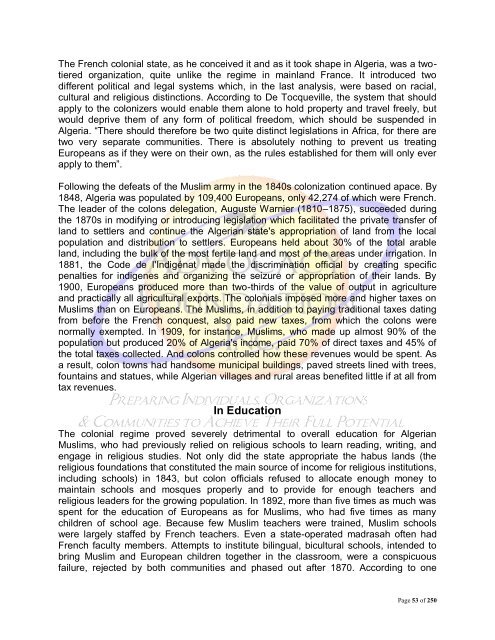Institutional Racism
Institutional Racism
Institutional Racism
Create successful ePaper yourself
Turn your PDF publications into a flip-book with our unique Google optimized e-Paper software.
The French colonial state, as he conceived it and as it took shape in Algeria, was a twotiered<br />
organization, quite unlike the regime in mainland France. It introduced two<br />
different political and legal systems which, in the last analysis, were based on racial,<br />
cultural and religious distinctions. According to De Tocqueville, the system that should<br />
apply to the colonizers would enable them alone to hold property and travel freely, but<br />
would deprive them of any form of political freedom, which should be suspended in<br />
Algeria. “There should therefore be two quite distinct legislations in Africa, for there are<br />
two very separate communities. There is absolutely nothing to prevent us treating<br />
Europeans as if they were on their own, as the rules established for them will only ever<br />
apply to them”.<br />
Following the defeats of the Muslim army in the 1840s colonization continued apace. By<br />
1848, Algeria was populated by 109,400 Europeans, only 42,274 of which were French.<br />
The leader of the colons delegation, Auguste Warnier (1810–1875), succeeded during<br />
the 1870s in modifying or introducing legislation which facilitated the private transfer of<br />
land to settlers and continue the Algerian state's appropriation of land from the local<br />
population and distribution to settlers. Europeans held about 30% of the total arable<br />
land, including the bulk of the most fertile land and most of the areas under irrigation. In<br />
1881, the Code de l'Indigénat made the discrimination official by creating specific<br />
penalties for indigenes and organizing the seizure or appropriation of their lands. By<br />
1900, Europeans produced more than two-thirds of the value of output in agriculture<br />
and practically all agricultural exports. The colonials imposed more and higher taxes on<br />
Muslims than on Europeans. The Muslims, in addition to paying traditional taxes dating<br />
from before the French conquest, also paid new taxes, from which the colons were<br />
normally exempted. In 1909, for instance, Muslims, who made up almost 90% of the<br />
population but produced 20% of Algeria's income, paid 70% of direct taxes and 45% of<br />
the total taxes collected. And colons controlled how these revenues would be spent. As<br />
a result, colon towns had handsome municipal buildings, paved streets lined with trees,<br />
fountains and statues, while Algerian villages and rural areas benefited little if at all from<br />
tax revenues.<br />
In Education<br />
The colonial regime proved severely detrimental to overall education for Algerian<br />
Muslims, who had previously relied on religious schools to learn reading, writing, and<br />
engage in religious studies. Not only did the state appropriate the habus lands (the<br />
religious foundations that constituted the main source of income for religious institutions,<br />
including schools) in 1843, but colon officials refused to allocate enough money to<br />
maintain schools and mosques properly and to provide for enough teachers and<br />
religious leaders for the growing population. In 1892, more than five times as much was<br />
spent for the education of Europeans as for Muslims, who had five times as many<br />
children of school age. Because few Muslim teachers were trained, Muslim schools<br />
were largely staffed by French teachers. Even a state-operated madrasah often had<br />
French faculty members. Attempts to institute bilingual, bicultural schools, intended to<br />
bring Muslim and European children together in the classroom, were a conspicuous<br />
failure, rejected by both communities and phased out after 1870. According to one<br />
Page 53 of 250

















